| Listing 1 - 10 of 10 |
Sort by
|
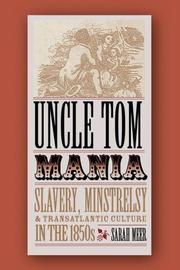
ISBN: 0820327379 Year: 2005 Publisher: Athens London University of Georgia Press
Abstract | Keywords | Export | Availability | Bookmark
 Loading...
Loading...Choose an application
- Reference Manager
- EndNote
- RefWorks (Direct export to RefWorks)
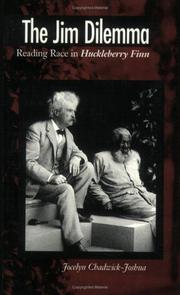
ISBN: 1578060613 Year: 1998 Publisher: Jackson University Press of Mississippi
Abstract | Keywords | Export | Availability | Bookmark
 Loading...
Loading...Choose an application
- Reference Manager
- EndNote
- RefWorks (Direct export to RefWorks)
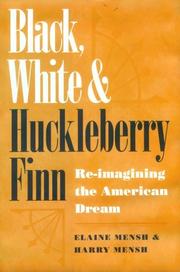
ISBN: 0585300607 9780585300603 9780817309954 0817309950 9780817311308 0817311300 9780817313517 0817313516 0817309950 9780585300607 9780817309950 Year: 2000 Publisher: Tuscaloosa, Ala University of Alabama Press
Abstract | Keywords | Export | Availability | Bookmark
 Loading...
Loading...Choose an application
- Reference Manager
- EndNote
- RefWorks (Direct export to RefWorks)
This consequential book takes a hard, systematic look at the depiction of blacks, whites, and race relations in Mark Twain's classic novel, raising questions about its canonical status in American literature. Huckleberry Finn, one of the most widely taught novels in American literature, has long been the subject of ongoing debates over issues ranging from immorality to racism. Here, Elaine Mensh and Harry Mensh enter the debate with a careful and thoughtful examination of racial messages imbedded in the tale of Huck and Jim. Using as a gauge
Adventure stories, American -- History and criticism. --- African Americans in literature. --- Fugitive slaves in literature. --- Literature and society -- United States -- History -- 19th century. --- National characteristics, American, in literature. --- Race relations in literature. --- Twain, Mark, -- 1835-1910 -- Political and social views. --- Twain, Mark, -- 1835-1910. -- Adventures of Huckleberry Finn. --- Literature and society --- Adventure stories, American --- National characteristics, American, in literature --- African Americans in literature --- Fugitive slaves in literature --- Race relations in literature --- English --- Languages & Literatures --- American Literature --- Afro-Americans in literature --- Negroes in literature --- History --- History and criticism --- Twain, Mark --- Twain, Mark, --- Finn, Huckleberry --- Finn, Huck --- History and criticism.

ISBN: 286537985X 9782865379859 Year: 2000 Publisher: Paris : Karthala,
Abstract | Keywords | Export | Availability | Bookmark
 Loading...
Loading...Choose an application
- Reference Manager
- EndNote
- RefWorks (Direct export to RefWorks)
West Indian literature (French) --- Fugitive slaves in literature. --- Littérature antillaise (française) --- Esclaves fugitifs dans la littérature --- History and criticism. --- History and criticism --- Histoire et critique --- Slavery in literature. --- Littérature antillaise (française) --- Esclaves fugitifs dans la littérature --- West Indian literature (French) - History and criticism.
Book
ISBN: 3110761033 3110760592 Year: 2022 Publisher: Berlin/Boston De Gruyter
Abstract | Keywords | Export | Availability | Bookmark
 Loading...
Loading...Choose an application
- Reference Manager
- EndNote
- RefWorks (Direct export to RefWorks)
This book tests the limits of fugitivity as a concept in recent Black feminist and Afro-pessimist thought. It follows the conceptual travels of confinement and flight through three major Black writing traditions in North America from the 1840s to the early 21st century. Cultural analysis is the basic methodological approach and recent concepts of captivity and fugitivity in Afro-pessimist and Black feminist theory form the theoretical framework.
American literature --- Captivity in literature. --- Fugitive slaves in literature. --- African American authors --- History and criticism. --- Black American Literature, Fugitive Narration, Borders. --- African Americans in literature. --- American literature. --- African American authors. --- African American literature (English) --- Black literature (American) --- Negro literature --- English literature --- Agrarians (Group of writers) --- Afro-Americans in literature --- Negroes in literature --- Afro-American authors --- Negro authors --- Black American Literature --- Fugitive Narration --- Borders
Book
ISBN: 9781439186961 Year: 2015 Publisher: New York London [etc.] Simon & Schuster
Abstract | Keywords | Export | Availability | Bookmark
 Loading...
Loading...Choose an application
- Reference Manager
- EndNote
- RefWorks (Direct export to RefWorks)
Blancs dans la littérature --- Blanken in de literatuur --- Boys in literature --- Esclaves fugitifs dans la littérature --- Fugitive slaves in literature --- Garçons dans la littérature --- Jongens in de literatuur --- Race relations in literature --- Rassenverhoudingen in de literatuur --- Relations raciales dans la littérature --- Voortvluchtige slaven in de literatuur --- Whites in literature --- Twain, Mark --- Criticism and interpretation --- Political and social views --- Literature and society --- United States --- History --- 19th century --- Race relations
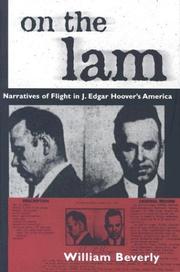
ISBN: 1578065372 Year: 2003 Publisher: Jackson, Miss. University Press of Mississippi
Abstract | Keywords | Export | Availability | Bookmark
 Loading...
Loading...Choose an application
- Reference Manager
- EndNote
- RefWorks (Direct export to RefWorks)
American fiction --- Criminals in literature --- Film noir --- Fugitives from justice in literature --- Fugitives from justice in motion pictures --- Fugitive slaves in literature --- Justice, Administration of, in literature --- Justice, Administration of, in motion pictures --- Narration (Rhetoric) --- Motion pictures --- Narrative (Rhetoric) --- Narrative writing --- Rhetoric --- Discourse analysis, Narrative --- Narratees (Rhetoric) --- History and criticism --- Hoover, J. Edgar --- Hoover, John Edgar, --- Hu-fo, --- Guver, Dzhon Ėdgar, --- Influence. --- Film --- Fiction --- Thematology --- American literature
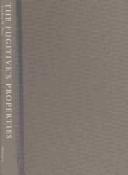
ISBN: 1282584693 9786612584695 0226241114 9780226241111 9780226044330 0226044335 0226044335 0226044343 9780226044347 Year: 2004 Publisher: Chicago University of Chicago Press
Abstract | Keywords | Export | Availability | Bookmark
 Loading...
Loading...Choose an application
- Reference Manager
- EndNote
- RefWorks (Direct export to RefWorks)
In this study of literature and law before and since the Civil War, Stephen M. Best shows how American conceptions of slavery, property, and the idea of the fugitive were profoundly interconnected. The Fugitive's Properties uncovers a poetics of intangible, personified property emerging out of antebellum laws, circulating through key nineteenth-century works of literature, and informing cultural forms such as blackface minstrelsy and early race films. Best also argues that legal principles dealing with fugitives and indebted persons provided a sophisticated precursor to intellectual property law as it dealt with rights in appearance, expression, and other abstract aspects of personhood. In this conception of property as fleeting, indeed fugitive, American law preserved for much of the rest of the century slavery's most pressing legal imperative: the production of personhood as a market commodity. By revealing the paradoxes of this relationship between fugitive slave law and intellectual property law, Best helps us to understand how race achieved much of its force in the American cultural imagination. A work of ambitious scope and compelling cross-connections, The Fugitive's Properties sets new agendas for scholars of American literature and legal culture.
American literature --- Slavery in literature. --- Fugitive slaves --- Law and literature --- African Americans in literature. --- Fugitive slaves in literature. --- Property in literature. --- Race in literature. --- Afro-Americans in literature --- Negroes in literature --- Literature and law --- Literature --- Slavery and slaves in literature --- Slaves in literature --- History and criticism. --- Legal status, laws, etc. --- History --- Stowe, Harriet Beecher, --- Enslaved persons in literature --- literature, law, slavery, fugitive, property, antebellum, blackface, minstrelsy, race films, appearance, expression, personhood, commodity, commodification, patents, uncle toms cabin, harriet beecher stowe, theft, gift, copyright, nonfiction, possession, chattel, labor, power, agency, wealth, economics, gender, masculinity, femininity.

ISBN: 0299155307 9780299155308 029915534X 9780299155346 0299155331 9780299155339 Year: 1997 Publisher: Madison, Wis. University of Wisconsin Press
Abstract | Keywords | Export | Availability | Bookmark
 Loading...
Loading...Choose an application
- Reference Manager
- EndNote
- RefWorks (Direct export to RefWorks)
Twain, Mark --- Junior high school students --- National characteristics, American, in literature. --- American fiction --- Literature and society --- Finn, Huckleberry (Fictitious character) --- African Americans in literature. --- Fugitive slaves in literature. --- Race relations in literature. --- Racism in literature. --- Boys in literature. --- Canon (Literature) --- Classics, Literary --- Literary canon --- Literary classics --- Best books --- Criticism --- Literature --- Afro-Americans in literature --- Negroes in literature --- Literature and sociology --- Society and literature --- Sociology and literature --- Sociolinguistics --- American literature --- Books and reading --- Study and teaching (Secondary) --- History. --- History and criticism --- Social aspects --- Twain, Mark, --- Mississippi River --- In literature.
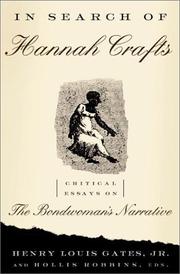
ISBN: 0465027148 9780465027149 Year: 2004 Publisher: New York Basic Civitas Books
Abstract | Keywords | Export | Availability | Bookmark
 Loading...
Loading...Choose an application
- Reference Manager
- EndNote
- RefWorks (Direct export to RefWorks)
Essays offer a critical analysis of "The Bondwoman's Narrative," a first novel written by a female African-American slave, assessing the influence of the work on our view of slavery, African-American history, and antebellum literature.
African American women in literature. --- Fugitive slaves in literature. --- Passing (Identity) in literature. --- Plantation life in literature. --- Racially mixed people in literature. --- Slavery in literature. --- Women and literature --- History --- Crafts, Hannah. --- North Carolina --- Virginia --- In literature. --- African American women in literature --- Racially mixed people in literature --- Passing (Identity) in literature --- Plantation life in literature --- Fugitive slaves in literature --- Slavery in literature --- Slavery and slaves in literature --- Slaves in literature --- Mulattoes in literature --- Afro-American women in literature --- Commonwealth of Virginia --- Old Dominion --- Sodruzhestvo Virdzhiniĭ --- Virdzhinii︠a︡ --- Colony and Dominion of Virginia --- Colony of Virginia --- Virginia Colony --- West Virginia --- Northwest Territory --- Kentucky --- Virginia (Reorganized government : 1861-1863) --- State of North Carolina --- Carolina del Norte --- NC --- N.C. (North Carolina) --- N. Car. --- Noord-Carolina --- Carolina d'o Norte --- Estato de Carolina d'o Norte --- Şimali Karolina --- Штат Паўночная Караліна --- Shtat Paŭnochnai︠a︡ Karalina --- Паўночная Караліна --- Paŭnochnai︠a︡ Karalina --- Not Carolina --- Sjeverna Carolina --- Carolina an Norzh --- Norzhkarolina --- Северна Каролина --- Severna Karolina --- Щат Северна Каролина --- Shtat Severna Karolina --- Carolina del Nord --- Çурçĕр Каролина --- Śurśĕr Karolina --- Severní Karolína --- Gogledd Carolina --- Náhookǫsjí Kééláanah Hahoodzo --- Põhja-Carolina --- Põhja-Carolina osariik --- Βόρεια Καρολίνα --- Voreia Karolina --- Πολιτεία της Βόρειας Καρολίνας --- Politeia tēs Voreias Karolinas --- Estado de Carolina del Norte --- Norda Karolino --- Ipar Carolina --- Caroline du Nord --- Noard Karolina --- Carolina Thuaidh --- Carolina Hwoaie --- Poyraz Karolina --- Carolina a Tuath --- Ар Карелайн --- Ar Karelaĭn --- Norda-Karolina --- Nort Kárólínạ --- Carolina Utara --- Negara Bagian Carolina Utara --- Kaaruuliinaa tunuviaq --- Nigiq Carolina --- Цæгат Каролинæ --- T︠S︡ægat Karolinæ --- Norður-Karólína --- קרוליינה הצפונית --- Ḳarolinah ha-Tsefonit --- Karolina Gledh --- Karolin dinò --- Karolînaya Bakur --- Йыдвел Каролина --- Ĭydvel Karolina --- Province of North Carolina --- Crafts, Hannah --- קראפטס, האנה --- Bond, Hannah --- Enslaved persons in literature
| Listing 1 - 10 of 10 |
Sort by
|

 Search
Search Feedback
Feedback About UniCat
About UniCat  Help
Help News
News